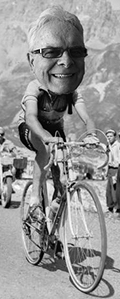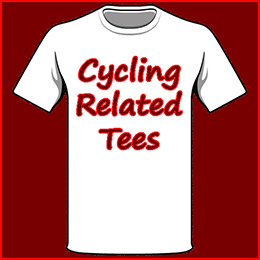Justifying ingrained behavior
 Mon, April 16, 2012
Mon, April 16, 2012 I first rode a bike as a child in England in the 1940s; I started riding at a club level in the early 1950s at fifteen years old, and began racing a year later when I was sixteen.
Right from the start I was taught the rules of the road in school; we were given a Highway Code book that laid out all the rules and laws for pedestrians, cyclists, and motorists. We studied the rules for cycling and later took a Cycling Proficiency Test; on passing we were given a certificate.
I left England in 1979, and up until that time I do not recall a single instance of seeing an adult on a bicycle riding on the wrong side of the road, riding on the sidewalk (Or pavement as it is known in the UK.) I never saw anyone ride through a red light.
I have said this before but it bears repeating. I was amazed when I arrived in the US and found there were absolutely no rules for cyclists; people pretty much rode anywhere and in any way they pleased. I remember my first ride with the bike club in New Jersey, a traffic light turned red, I stopped, and everyone else just kept on riding.
Just last week I listened to a half hour broadcast on National Public Radio. The subject was, “Are cyclists their own worst enemy? The link is below, and if you haven’t heard it, it brings up some interesting points.
People phoned in and several admitted that they broke the rules of the road, and some went even further and said a person had to be crazy not to break the rules, because that was a good way to get yourself killed.
The strange thing is I follow rules of the road most of them to the letter; it was ingrained in me as a kid and has stayed with me since. I do not find myself in danger because of this.
Listening to these cyclists talk about the way they ride, it occurred to me that they were simply riding the same way they had always done since they were children. Taking the shortest and most convenient route, whether that is the sidewalk, or the wrong side of the street, whatever.
As kids no one ever told them they shouldn’t do that; no one really cared, they were just kids, doing what kids do. This manner of riding has become ingrained as surely as my style of riding. And now they justify it as somehow necessary and a safer way to ride.
It is not a safer way to ride; the safe way is to follow the rules, because if you at least try to do that everyone else knows what you intend to do.
It annoys me that many car drivers will not lift one finger to operate their turn signals, if they obeyed the law and used their turn signals everyone else would know what their intentions are.
This brings me to another point that was brought up time and time again during this broadcast that motorists also don’t obey the rules, but cyclists get noticed more; again this is an excuse to justify law breaking.
Stop and think about it, this was one of the rules that our parents and teachers tried to drum into us; pointing a finger at someone doing the same wrong was never a valid excuse. What was it they always told us? “If Johnny jumped off a cliff, would you do the same?”
The fact that so many motorists break the law is society’s problem. A teenager is given a minimum amount of drivers’ education and he/she is allowed to drive. There is no follow up or later test and people quickly learn to do whatever they can get away with.
Cyclists on the other hand are given no training what-so-ever; they are never told what they can and can’t do to begin with.
When I first witnessed the lawlessness by people on bicycles in New Jersey 1979, no one really cared; there were not that many cyclists. Now we have an ever growing number of cyclists in our larger cities, and we are on a fast track towards absolute chaos.
There has to be a uniform and acceptable pattern of behavior that everyone can follow. Below is what I think most cyclists who consider themselves to be “Law abiding” would follow.
1.) Ride with the flow of traffic (Never ride the wrong way.)
2.) Don’t ride on the sidewalk
3.) Use hand signals if you want to change direction
4.) Stop at red lights
5.) Don’t blow through stop signs at speed, or go out of turn
6.) If you are riding in a crowded city, especially during rush hour with a lot of cars, pedestrians, and other cyclists; ride at a sensible speed. Your commute is not a race; if it is you need to leave home a little earlier.
Licensing all people who own and ride a bike would be an impractical bureaucratic nightmare, but clearly a situation where everyone does as they please is not good either. What do you think; does something need to be done, and if so what?
 Dave Moulton | Comments Off |
Dave Moulton | Comments Off | 























Reader Comments (9)
Well said. I cringe every time I see a fellow cyclist breaking the road rules. It is so often used against us that we need to be conscious of the need to be better ambassadors for cycling.
As a cyclist who grew up in the UK just a decade later (1950s), raced and completed the same Cycling Proficiency Test, then emigrated to North America--Canada to be exact--I have asked myself the same questions for over 4 decades.
It may take another generation to see change, but here, as in the US, we still need to institute the kind of children's cycling instruction common in the UK, all those years ago.
Maybe then, common sense may work its way up.
I cringe at the thought of cycle licensing here in the UK, but the temptation for the government to introduce it as a much needed revenue stream must be strong. I hope it doesn't come to that, it is about the only free and unregulated activity left.
Very good observations Dave! I expressed my feelings here: http://bostonbybike.blogspot.com/2011/12/do-you-really-know-how-to-drive.html
The best thing that can be done is education. Why don't we require traffic code classes at schools? We should start early in primary school and then continue in middle school and high school. This is the only way to teach future generations how to handle different road situations and not kill themselves (or each other). Those classes should be mandatory for every child and their completion should be required in order to get the driver's license.
We truly are our own worst enemy. The number of cyclists who obey basic traffic laws in the San Francisco Bay Area is probably 2 or perhaps 3 percent.
I'm a former police officer and I always stop for red lights and stop signs - always - even if there's not another vehicle in sight. Doesn't matter. I ask myself, "Would I stop if I were driving a car or riding a motorcycle?" If the answer is yes (which it always is) then I do the same on my bicycle.
However, as a vehicle if necessary I will take a lane and exercise my privilege if need be. This doesn't always sit well with automobile drivers but tough - every single bicycle on the road means one less car, making our roads more tractable for everyone.
Grrrr!
Good old NPR always pushing the status quo. Which, in this case, means Cars were here first, so to speak. Consider the bit about the woman with the kids and the groceries worried about getting "doored." And, Neal Conan describes that event as the poor hapless diver who opens their car door only to have a cyclist "drive right into it." Drive right into it? On purpose?, a listener who is not a cyclist wonders. How rude!, they conclude.
Yes, it would be nice if all users of the road followed the rules, obeyed the traffic signals and signs, and were sufficiently insightful to allow that we're all just trying to get somewhere. And, were willing to allow that a little courtesy would get us all there with a lot less aggravation. IMHO, one would need to dig into the American cultural psyche to understand that framework isn't the first place Americans go. And, I feel okay saying that as a member of tribe steeped from birth in that culture.
As a cyclist, I take my sub-group membership seriously. I remind myself that I can either create good will or ill will for other cyclists. And, given that I leave the bike rack on my car pretty much year round, I figure being behind the wheel of my car doesn't exempt me from that ambassadorship. It's not rocket science - particularly in the US - to grasp the idea that members of a minority cast a long shadow over everyone sharing that minority status. I take my representative status to heart even as I know there is often more variation within a group, or sub-group, than between groups.
For my money, Tom Vanderbilt was the star of that audio clip. I need to go read his book Traffic. Having had a job which required a 150 miles a day commute for a few years, I've no doubt I'd find it fascinating. But, his broader point - in this context - that sometimes cyclists do what they do because they're actually "set up" to do it, really resonated for me.
Harrumph.
I agree with what you write within the context of busy traffic. To stop for a traffic light or give a hand signal on a completely empty street on Sunday morning (for example) would be robotic, which kinda rhymes with idiotic.
When I ride my bike my motto is "do no harm" (including to myself). During my commute from work home there is a stretch of a very busy narrow road. When it gets jammed with cars and I see nobody or almost nobody on the sidewalk, I ride on the sidewalk; very slowly, and when I pass a pedestrian I move as far away from him/her as I can or I slow down to a crawl. So it depends on the situation. Perhaps God gave us intelligence for a reason...
I believe there should be a complete session, during drivers training, where a police officer covers the rules of cycling with all the students. A cop will get there attention and the students are motivated to listen as the drivers test would include questions about cycling.
I am working through my police department with a state legislator to make this law in Idaho. So far so good.
Yes obey the rules and create an environment of respect for all road users (pedestrians, cyclist, drivers, etc), but that is unlikely. Our streets are not designed for cyclists and they are most likely to remain a minority (unless gas prices skyrocket).
As Vanderbilt explains: "In the U.S.... there's kind of this marginalization, almost criminalization that cyclists feel on the road, attributed to a sense of persecution. When a car and a bike collide...the cyclist is immediately put into question first. Often [there are] no repercussions for the driver, even when they were clearly at fault."
Until cyclists get proper respect (road design, law enforcement), I don't expect their behavior to change. Nor do I expect that drivers will change their unlawful behavior anytime soon as they are rarely held accountable. Our streets will remain "war zones" until the public is educated on the issues and drivers remain "entitled". How often do you hear drivers complain that there are not enough lanes and not enough FREE parking?